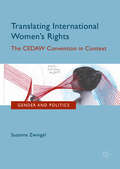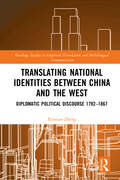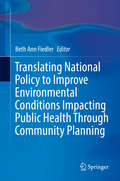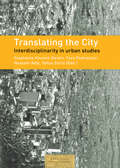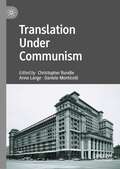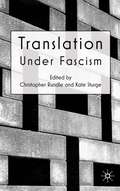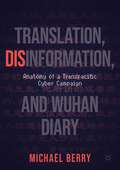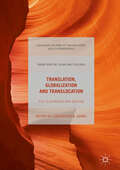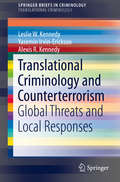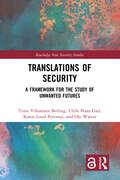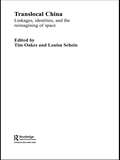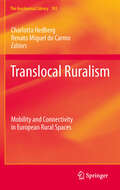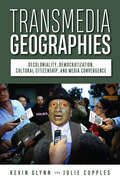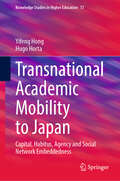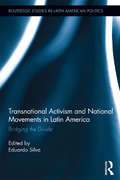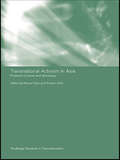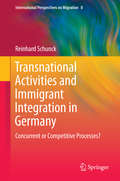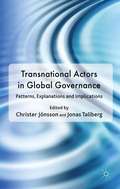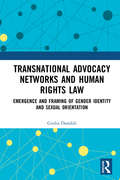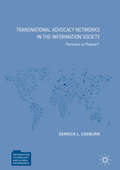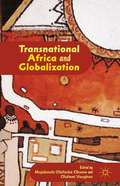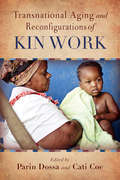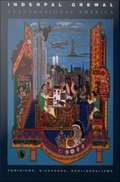- Table View
- List View
Translating International Women's Rights
by Susanne ZwingelThis book looks at the centerpiece of the international women's rights discourse, the Convention on the Elimination of all Forms of Discrimination against Women (CEDAW), and asks to what extent it affects the lives of women worldwide. Rather than assuming a trickle-down effect, the author discusses specific methods which have made CEDAW resonate. These methods include attempts to influence the international level by clarifying the meaning of women's rights and strengthening the Convention's monitoring procedure, and building connections between international and domestic contexts that enable diverse actors to engage with CEDAW. This analysis shows that while the Convention has worldwide impact, this impact is fundamentally dependent on context-specific values and agency. Hence, rather than thinking of women's rights exclusively as normative content, Zwingel suggests to see them as in process. This book will especially appeal to students and scholars interested in transnational feminism and gender and global governance.
Translating National Identities Between China and the West: Diplomatic Political Discourse 1792–1867 (Routledge Studies in Empirical Translation and Multilingual Communication)
by Xinnian ZhengThis book explores the discursive construction of national identities in diplomatic political discourse, focusing on translation’s pivotal role. It examines diplomatic exchanges between China and the West from 1792 to 1867, a period marked by China’s national identity crisis. By combining Descriptive Translation Studies (DTS) with Discourse-Historical Approach (DHA), the book uncovers how translation shaped the national identities of both China and the West during a time of intercultural conflict and change.Through the analysis of 29 authentic historical documents, the book offers a groundbreaking analysis of how translators at the Qing court initially portrayed China as superior and the West as inferior. However, as China’s global position shifted, so did its translation strategies, gradually transforming China’s national identity to be seen as equal to the West. During diplomatic interactions, translators played a crucial role in shaping perceptions of both Chinese and Western identities, thereby influencing international relations.Essential for scholars and students of translation studies, political discourse, and Chinese history, this book goes beyond traditional analysis, offering a new perspective on the intricate relationship between translation, power, and identity. Its blend of qualitative and quantitative methods provides a comprehensive view of East-West relations during a pivotal period in world history.
Translating National Policy to Improve Environmental Conditions Impacting Public Health Through Community Planning
by Beth Ann FiedlerThis first-of-its-kind volume traces rarely explored links between public policy, the state of the environment, and key issues in public health, with recommendations for addressing longstanding intractable problems. Experts across diverse professions use their wide knowledge and experience to discuss hunger and food sustainability, land use, chronic and communicable diseases, child mortality, and global water quality. Interventions described are varied as well, from green technology breakthroughs to regulatory accountability, innovative urban planning and community policing programs. Chapters build and expand on each other’s themes inspiring deeper understanding and critical thinking that further prompts readers to develop practical solutions leading to improvements in planetary and population health outcomes. Included in the coverage:· The challenge of implementing macroeconomic policy in an increasingly microeconomic world· Green aid flows: trends and opportunities for developing countries· Planning healthy communities: abating preventable chronic diseases· Foundations of community health: planning access to public facilities · International changes in environmental conditions and their personal health consequences Translating National Policy to Improve Environmental Conditions Impacting Public Health is developed for educators, students, and policymakers to generate awareness and review options to help create change in their communities. Federal agencies such as the Department of Health and Human Services, the National Institutes of Health, the EPA, and Housing and Urban Development will also find it salient.
Translating the City: Interdisciplinarity In Urban Studies
by Yves Pedrazzini Yafiza Zorro Hossam Aldy Stéphanie Vincent-GeslinThe city is a highly fragmented, heterogeneous subject; those who study, analyze and question it make a use of a variety of disciplines and methods and have different areas of expertise. How is a dialogue built between heterogeneous urban contexts and urban researchers, architects, developers, anthropologists, sociologists and political scientists? What capacity do concepts and methods have to travel from one context to another? How can they be transferred? The strength of Urban Translations lies in its disciplinary and geographical comparison and dialogue on a global scale. It openly targets an international audience, bringing together leading researchers from a variety of disciplines (urban planning, sociology, architecture and anthropology) and presenting case studies from highly contrasting urban settings, including Rio de Janeiro, Mumbai, Cape Town, Dubai, Montreal, Geneva, Lisbon, Ljubljana and Berlin.
Translation Under Communism
by Christopher Rundle Anne Lange Daniele MonticelliThis book examines the history of translation under European communism, bringing together studies on the Soviet Union, including Russia and Ukraine, Yugoslavia, Hungary, East Germany, Czechoslovakia, Bulgaria, and Poland. In any totalitarian regime maintaining control over cultural exchange is strategically important, so studying these regimes from the perspective of translation can provide a unique insight into their history and into the nature of their power. This book is intended as a sister volume to Translation Under Fascism (Palgrave Macmillan, 2010) and adopts a similar approach of using translation as a lens through which to examine history. With a strong interdisciplinary focus, it will appeal to students and scholars of translation studies, translation history, censorship, translation and ideology, and public policy, as well as cultural and literary historians of Eastern Europe, Soviet communism, and the Cold War period.
Translation under Fascism
by Christopher Rundle Kate SturgeThe history of translation has focused on literary work but this book demonstrates the way in which political control can influence and be influenced by translation choices. New research and specially commissioned essays give access to existing research projects which at present are either scattered or unavailable in English.
Translation, Disinformation, and Wuhan Diary: Anatomy of a Transpacific Cyber Campaign
by Michael BerryDuring the early days of the COVID-19 health crisis, Fang Fang’s Wuhan Diary provided an important portal for people around the world to understand the outbreak, local response, and how the novel coronavirus was impacting everyday people. But when news of the international publication of Wuhan Diary appeared online in early April of 2020, Fang Fang’s writings became the target of a series of online attacks by “Chinese ultra-nationalists.” Over time, these attacks morphed into one of the most sophisticated and protracted hate Campaigns against a Chinese writer in decades. Meanwhile, as controversy around Wuhan Diary swelled in China, the author was transformed into a global icon, honored by the BBC as one of the most influential women of 2020 and featured in stories by dozens of international news outlets. This book, by the translator of Wuhan Diary into English, alternates between a first-hand account of the translation process and more critical observations on how a diary became a lightning rod for fierce political debate and the target of a sweeping online campaign that many described as a “cyber Cultural Revolution.” Eventually, even Berry would be pulled into the attacks and targeted by thousands of online trolls. This book answers the questions: why would an online lockdown diary elicit such a strong reaction among Chinese netizens? How did the controversy unfold and evolve? Who was behind it? And what can we learn from the “Fang Fang Incident” about contemporary Chinese politics and society? The book will be of interest to students and scholars of translation, as well as anyone with special interest in translation, US-Chinese relations, or internet culture more broadly.
Translation, Globalization and Translocation
by Concepción B. GodevThis book examines the spaces where translation and globalization intersect, whether they be classrooms, communities, or cultural texts. It foregrounds the connections between cultural analysis, literary critique, pedagogy and practice, uniting the disparate fields that operate within translation studies. In doing so, it offers fresh perspectives that will encourage the reader to reappraise translation studies as a field, reaffirming the directions that the subject has taken over the last twenty years. Offering a comprehensive analysis of the links between translation and globalization, this ambitious edited collection will appeal to students and scholars who work in any area of translation studies.
Translational Criminology and Counterterrorism
by Leslie W. Kennedy Yasemin Irvin-Erickson Alexis R. KennedyThis brief focuses on translational criminology practices as they relate to counter-terrorism and homeland security. The work provides a detailed and practical examination of how global threats (such as, terrorism and cybercrime) are managed through local response. It covers emerging strategies in data collection procedures, inter-agency cooperation, and new analytical techniques including risk-terrain modeling. In addition, it presents a common methodology, including steps in risk assessment, risk management, and decision-making, that can be used to frame and analyze global and local threats. The authors examine these issues using examples of how law enforcement responded to specific security threats including the 2013 Boston Marathon bombings, the 2003 terrorist attack in Istanbul, Turkey, and the 2010 Stuxnet attack on the Natanz nuclear facility in Iran. This work expands on existing literature covering the impact that globalization has on cross national threats, drawing on disciplines related to criminology, such as international relations and political science.
Translations of Security: A Framework for the Study of Unwanted Futures (Routledge New Security Studies)
by Ulrik Pram Gad Ole Waever Karen Lund Petersen Trine Villumsen BerlingThis book scrutinizes how contemporary practices of security have come to rely on many different translations of security, risk, and danger. Institutions of national security policies are currently undergoing radical conceptual and organizational changes, and this book presents a novel approach for how to study and politically address the new situation. Complex and uncertain threat environments, such as terrorism, climate change, and the global financial crisis, have paved the way for new forms of security governance that have profoundly transformed the ways in which threats are handled today. Crucially, there is a decentralization of the management of security, which is increasingly handled by a broad set of societal actors that previously were not considered powerful in the conduct of security affairs. This transformation of security knowledge and management changes the meaning of traditional concepts and practices, and calls for investigation into the many meanings of security implied when contemporary societies manage radical dangers, risks and threats. It is necessary to study both what these meanings are and how they developed from the security practices of the past. Addressing this knowledge gap, the book asks how different ideas about threats, risk, and dangers meet in the current practices of security, broadly understood, and with what political consequences. This book will be of interest to students of critical security studies, anthropology, risk studies, science and technology studies and International Relations. The Open Access version of this book, available at https://www.routledge.com/Translations-of-Security-A-Framework-for-the-Study-of-Unwanted-Futures/Berling-Gad-Petersen-Waever/p/book/9781032007090, has been made available under a Creative Commons Attribution-Non Commercial-No Derivatives 4.0 license
Translocal China: Linkages, Identities and the Reimagining of Space (Routledge Studies on China in Transition #Vol. 24)
by Louisa Schein Tim OakesInter-disciplinary in approach, this collection of essays explores China’s reform era development within the concept of translocality. A key element of spatial change in today’s China has been the unprecedented geographic mobility of millions of labour migrants, tourists, brides, entrepreneurs, and many others. But translocality doesn’t just mean people. It is crucially constituted by the circulation of capital, ideas, images, goods, styles, services, and disease to name but a few. With contributions from well-respected China specialists, the essays focus simultaneously on mobilities and localities, drawing our attention to the multiplying forms of mobility in China whilst retaining the importance of localities in people’s lives. The book provides a clear path to understanding the importance of translocality as a concept along with concrete examples of its operation in China. Unique in approach, it is at once a study of the connections between location and culture, politics, economics, bodies, gender and technology.
Translocal Ruralism
by Charlotta Hedberg Renato Miguel do CarmoRural areas are often viewed as isolated and stagnating areas and urban areas as their opposites. Against such a backdrop, this book seeks to unveil a set of dynamics that view rural areas as 'translocal' in the sense that they are 'changing' and 'interconnected'. Social transformations take place in rural areas as the result of intense exchanges between different people, settings and geographies. Accordingly, rural-urban but also rural-rural interrelations on international and national scales are strongly contributing to rural change. Translocal ruralism is exemplified through the analysis of local and global migratory flows, the activities of rural firms in national and global arenas, the spread of different forms of transportation and dislocation, and the growing information society, which enables rural spaces to be connected to the world and improves new ways of interconnection and sociability practices. The book is structured into two parts, which intertwine the dynamics of rural spaces. The first part, 'Linking nodes: people and networks connecting places', is concerned with mobilities such as migration and commuting, and the establishment of national and global networks. The second part, 'International mobilities: a tension between scales', analyses the dynamics of international migration and mobilities in rural areas.
Transmedia Geographies: Decoloniality, Democratization, Cultural Citizenship, and Media Convergence
by Julie Cupples Kevin GlynnLooking at the US, New Zealand, and Central America, this book considers how cultural politics has been deeply reworked in our contemporary media environment. The authors analyze how rampant technological convergence has allowed stories to spill across media platforms as well as geographical borders and how those stories reemerge as transmediated events. The authors explore the cultural politics that have developed within this new media environment by moving across the mediated landscapes of the first, third, and fourth (Indigenous people’s) worlds, which are deeply intertwined and interconnected under contemporary conditions of neoliberal globalization and emergent regimes of authoritarian postdemocracy. The book attends both to the platforms and digital networks of the new media environment and to the cultural forms and practices that have constituted television as the dominant medium of communication throughout the second half of the twentieth century. In the new media environment, transmediation works on behalf not only of those corporate megaconglomerates that have become all too familiar to media consumers around the world but also of many communities that have previously been excluded from access to the means of electronic textual production and circulation. For the latter, grassroots transmediation has become an important technique for the production of cultural citizenship.
Transnational Academic Mobility to Japan: Capital, Habitus, Agency and Social Network Embeddedness (Knowledge Studies in Higher Education #17)
by Hugo Horta Yifeng HongThis book addresses agency and habitus development of migrant academics in Japan and reveals the complexity of international academic mobility in East Asian contexts. It addresses differentiated transnational academic mobility routes and route-confined capitals and dispositions, the effect of stratified social networks and network embeddedness on international academic mobility, and the effect of unequal globalization and the asymmetrical internationalization of international academic mobility. The book highlights the roles of transnationally stretched social network development and network embeddedness along life trajectories, locating them as critical infrastructures of mobilities and identifying an array of individual social network building and maintenance strategies and principles. It illustrates how familial, educational, academic and social networks across borders facilitate and channel flows of capitals and resources vital for academic performance and upward academic mobility of migrated academics. It draws on a range of theoretical frameworks of Bourdieusian theory of sociology, transnationalism and qualitative social network analysis. The research is based on 26 case studies of migrant scholars in Japan, using narrative inquiry and qualitative social network analysis. The work provides multiple implications for practitioners, policy makers and researchers who seek answers to the sustainability of the internationalization of higher education in Asia Pacific and emerging higher education hubs.
Transnational Activism And The Israeli-palestinian Conflict
by Maia Carter HallwardThis book examines the polarization of positions surrounding the transnational boycott, divestment, and sanctions (BDS) movement aimed at ending the Israeli occupation. The author compares four US-based case studies in which activists for and against BDS struggle over issues of identity, morality, legitimacy, and conceptions of "peace. "
Transnational Activism and National Movements in Latin America: Bridging the Divide (Routledge Studies in Latin American Politics)
by Eduardo SilvaDuring the 1990s, as widespread perception spread of declining state sovereignty, activists and social movement organizations began to form transnational networks and coalitions to pressure both intergovernmental organizations and national governments on a variety of issues. Research has focused on the formation of these transnational networks, campaigns, and coalitions; their objectives, strategies and tactics; and their impact. Yet the issue of how participation in transnational networks influences national level mobilization has been little analyzed. What effects has the experience of social movement organizations at the transnational scale had for the development at the national scale? This volume addresses this significant gap in the literature on transnational collective action by building on approaches that stress the multi-level characteristics of transnational relations. Edited by noted Latin American politics scholar Eduardo Silva, the contributions focus on four distinct themes to which the empirical chapters contribute: Building a Transnational Relations Approach to Multi-Level Interaction; Transnational Relations and Left Governments; North-South and South-South Linkages; and The "Normalization" of Labor. Bridging the Divide will add considerably to empirical knowledge of the ways in which transnational and national factors dynamically interact in Latin America. Additionally, the mid-range theorizing of the empirical chapters, along with the mix of positive and negative cases, raises new hypotheses and questions for further study.
Transnational Activism in Asia: Problems of Power and Democracy (Routledge Research in Transnationalism #Vol. 13)
by Anders Uhlin Nicola PiperThis book provides new perspectives on transnational activism with a specific regional focus on Asia. By offering an innovative approach, its theoretical chapters and empirical case studies examine macro as well as micro aspects of power and how cross-border activities of civil society groups are related to problems of democracy.
Transnational Activism in the UN and the EU: A comparative study (Routledge Advances in International Relations and Global Politics #Vol. 67)
by Jutta Joachim Birgit LocherComparing non-governmental organizations (NGOs) in the United Nations and the European Union across a range of different issue areas, this volume examines how the choice of venue and institution affects the strategies of NGOs. Despite significant differences with respect to their scope, membership as well as their institutional rules, the authors find that the UN and the EU have surprisingly similar effects on civil society organizations and regulate access in such a way that it significantly constrains the agency of NGOs. Highlights include: A comprehensive outline of the volume’s main research questions, situated within the existing literature on the topic Eight case studies of NGO involvement in the UN and the EU across a range of different areas, including human rights, the environment, socio-economic and security issues A theoretically grounded summary of case study findings, challenging the findings of previous studies regarding the power of NGOs A discussion of the finding’s implications for the broader literature, as well as for studies relating to the EU and the UN in particular Transnational Activism in the UN and the EU will be of interest to students and scholars of International Relations, European Studies, and Global Politics. Jutta Joachim is Associate Professor of Political Science at the University of Hannover, Germany. Birgit Locher is a Research Fellow at the Institute of Political Science at the University of Tübingen, Germany.
Transnational Activities and Immigrant Integration in Germany
by Reinhard SchunckThis book investigates both the causes and effects of transnational activities among immigrants in relation to their integration into the receiving society. It uses large scale, representative data about first and second generation immigrants in Germany. It develops a formal theoretical model, which explains both transnational involvement and paths of immigrant integration. Important questions are answered: What consequences does transnational involvement have on integration? Is transnational involvement a distinct form of integration? Is it an alternative to assimilation? Does it hinder or facilitate assimilation? Longitudinal analyses are presented which show that immigrant integration and transnational involvement do not necessarily oppose each other. The book shows that although low levels of integration may coincide with strong transnational ties, the relationship is not causal. This book shows how immigrant integration and transnational involvement are related to each other and how a joint examination of both processes may advance our understanding of the general dynamics of migration and integration.
Transnational Actors in Global Governance
by Christer Jönsson Jonas TallbergThe nature of global governance is changing, as are the standards by which we judge its legitimacy. We are witnessing a gradual and partial shift from inter-state co-operation to more complex forms of governance, involving participation by transnational actors, such as NGOs, party associations, philanthropic foundations and corporations.
Transnational Advocacy Networks and Human Rights Law: Emergence and Framing of Gender Identity and Sexual Orientation
by Giulia DondoliThis book asks the fundamental question of how new human rights issues emerge in the human rights debate. To answer this, the book focuses on nongovernmental organizations (NGOs) and on the case study of LGBTI (lesbian, gay, bisexual, transgender and intersex) rights. The work argues that the way in which NGOs decide their advocacy, conceptualise human rights violations and strategically present legal analysis to advance LGBTI human rights shapes the human rights debate. To demonstrate this, the book analyses three data sets: NGO written statements submitted to the United Nations Human Rights Council, NGO oral statements delivered during the Universal Periodic Review and 36 semi-structured interviews with NGO staff. Data are analysed with a combination of quantitative and qualitative approaches to discover what issues are most important for LGBTI networks (issue emergence) and how these issues are framed (issue framing). Along with NGO efficiency in lobbying for the emergence of new human rights standards, the book inevitably discusses important questions related to NGOs’ accountability and democratic legitimacy. The book thus asks whether the right to marry is important for LGBTI advocates working transnationally, because this right is particularly controversial among activists and LGBTI communities, especially in non-Western contexts.
Transnational Advocacy Networks in the Information Society: Partners or Pawns? (Information Technology and Global Governance)
by Derrick L. CogburnThis book examines the role of transnational advocacy networks in enabling effective participation for individual citizens in the deliberative processes of global governance. Contextualized around the international conference setting of the United Nations-sponsored World Summit on the Information Society (WSIS) in 2003 and 2005, the book sees epistemic communities and information and communication technologies (ICTs) as critical to the effectiveness of this important organizational form. Historically, governments have dominated the official “conference diplomacy” surrounding these World Summits. However, reflecting the UN General Assembly resolution authorizing WSIS, transnational civil society and private sector organizations were invited to participate as official partners in a multistakeholder dialogue at the summit alongside the more traditional governments and international organizations. This book asks: are transnational advocacy networks active in the global information society influential partners in these global governance processes, or merely symbolic tokens—or pawns? Cogburn explores the factors that enabled some networks—such as the Internet Governance Caucus—to persist and thrive, while others failed, and sees linkages with epistemic communities—such as the Global Internet Governance Academic Network—and ICTs as critical to network effectiveness.
Transnational Africa and Globalization
by Olufemi Vaughan Mojúbàolú Olúfúnké OkomeThe dawn of neoliberal rationality in Africa in the 1980s coincided with a massive exodus of skilled Africans to the global North. Moving beyond the 'push and pull' framework that has dominated studies of this phenomenon, this collection instead looks at African transnational migrations against the backdrop of rapid and intensifying globalization.
Transnational Aging and Reconfigurations of Kin Work
by Parin Dossa Cati Coe Delores V. Mullings Erin L. Raffety Karen Kobayashi Kristin Elizabeth Yarris Loretta Baldassar Mushira Mohsin Khan Neda Deneva Yanqiu Rachel ZhouTransnational Aging and Reconfigurations of Kin Work documents the social and material contributions of older persons to their families in settings shaped by migration, their everyday lives in domestic and community spaces, and in the context of intergenerational relationships and diasporas. Much of this work is oriented toward supporting, connecting, and maintaining kin members and kin relationships—the work that enables a family to reproduce and regenerate itself across generations and across the globe.
Transnational America: Feminisms, Diasporas, Neoliberalisms
by Inderpal GrewalIn Transnational America, Inderpal Grewal examines how the circulation of people, goods, social movements, and rights discourses during the 1990s created transnational subjects shaped by a global American culture. Rather than simply frame the United States as an imperialist nation-state that imposes unilateral political power in the world, Grewal analyzes how the concept of "America" functions as a nationalist discourse beyond the boundaries of the United States by disseminating an ideal of democratic citizenship through consumer practices. She develops her argument by focusing on South Asians in India and the United States. Grewal combines a postcolonial perspective with social and cultural theory to argue that contemporary notions of gender, race, class, and nationality are linked to earlier histories of colonization. Through an analysis of Mattel's sales of Barbie dolls in India, she discusses the consumption of American products by middle-class Indian women newly empowered with financial means created by India's market liberalization. Considering the fate of asylum-seekers, Grewal looks at how a global feminism in which female refugees are figured as human rights victims emerged from a distinctly Western perspective. She reveals in the work of three novelists who emigrated from India to the United States--Bharati Mukherjee, Chitra Banerjee Divakaruni, and Amitav Ghosh--a concept of Americanness linked to cosmopolitanism. In Transnational America Grewal makes a powerful, nuanced case that the United States must be understood--and studied--as a dynamic entity produced and transformed both within and far beyond its territorial boundaries.
